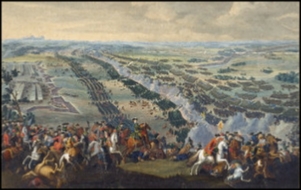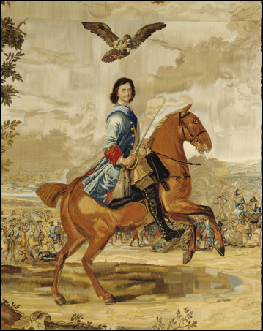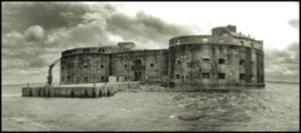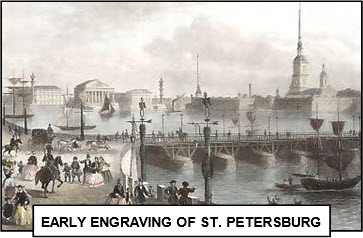


xxxxxAs we have seen (1702), the Swedish king Charles XII won a series of victories in the early days of the Great Northern War. By 1706 he had knocked Denmark out of the conflict, defeated the Russians at the Battle of Narva, and occupied Poland. However, by the time he invaded Russia in 1707 Peter the Great had rebuilt his army and navy. Advancing deep into Russia, the Swedish army ran out of supplies and became bogged down. They turned into the Ukraine and it was there they fought the Battle of Poltava in 1709. Though outnumbered in men and guns, the Swedes attacked, but their army was virtually annihilated. This defeat marked the end of Sweden’s bid for big power status. Charles managed to escape, but, on his return to Sweden, was killed in a war against Norway in 1718. As we shall see, by the Treaty of Nystadt in 1721 (G1), Russia emerged as a European power; gained command of the Baltic; and built St. Petersburg, Peter’s longed-
THE BATTLE OF POLTAVA AND ITS RESULTS 1709 (AN)
xxxxxAs we have seen, (1702), in the early years of the Great Northern War which broke out in 1700, the young Swedish king, Charles XII, won a series of victories. By 1706 he had knocked Denmark out of the conflict, defeated the Russians at the Battle of Narva, occupied Poland, and toppled the Polish king, Augustus II, from his throne in favour of his own candidate. However, by the time he turned his attack upon Russia, Peter the Great, had built a large navy of some 50 battleships, modernised his army on Western lines, and even started to attack and occupy some Swedish territory along the east coast of the Baltic Sea. Sweden's hero king faced a daunting task.
 xxxxxTaking, as always, the direct approach, Charles launched his attack on Russia in the autumn of 1707. He won the opening Battle of Holowczyn in July of the following year, but from then on the Russians dictated the course of the war. By adopting scorched-
xxxxxTaking, as always, the direct approach, Charles launched his attack on Russia in the autumn of 1707. He won the opening Battle of Holowczyn in July of the following year, but from then on the Russians dictated the course of the war. By adopting scorched-
 xxxxxWounded in the foot from an earlier encounter, Charles was unable to lead his army in person, but, in truth, this fact is not likely to have altered the ultimate outcome of the battle. The Swedes, 17,000 strong, were heavily outnumbered by a Russian force of some 80,000. In addition, they had lost a great deal of their artillery during their advance, and what pieces they had lacked a sufficient supply of gunpowder. Despite these shortages, Charles went on the attack. Skirting the Russians' forward positions, he launched his depleted army against the enemy's major stronghold. It was a daring plan, but there was some confusion among his commanders as to the ground movements and -
xxxxxWounded in the foot from an earlier encounter, Charles was unable to lead his army in person, but, in truth, this fact is not likely to have altered the ultimate outcome of the battle. The Swedes, 17,000 strong, were heavily outnumbered by a Russian force of some 80,000. In addition, they had lost a great deal of their artillery during their advance, and what pieces they had lacked a sufficient supply of gunpowder. Despite these shortages, Charles went on the attack. Skirting the Russians' forward positions, he launched his depleted army against the enemy's major stronghold. It was a daring plan, but there was some confusion among his commanders as to the ground movements and -
xxxxxFor European history, the results of the Battle of Poltava were profound. For Sweden it was a humiliating defeat, and marked the end of that country's bid for big-
 xxxxxFor Russia, the Battle of Poltava proved to be one of the greatest and most significant military victories in Russian history. By it, Peter
xxxxxFor Russia, the Battle of Poltava proved to be one of the greatest and most significant military victories in Russian history. By it, Peter  the Great gained control of the Baltic Sea, the provinces along its eastern shore, and a number of islands -
the Great gained control of the Baltic Sea, the provinces along its eastern shore, and a number of islands -
xxxxxAs we shall see, by the Treaty of Nystadt in 1721 (G1), twelve years later, Sweden formally conceded its place as a major power, and was never to rise to such heights again. Russia, on the other hand, gained control of the Baltic, and began its long, troubled history amid the turbulent politics of Europe.
xxxxxIncidentally, among his historical dramas, the outstanding 19th century Russian poet Aleksandre Pushkin produced a work on the Battle of Poltava in 1829, and a drama based on the legendary Peter the Great entitled The Bronze Horseman in 1837.
AN-
Acknowledgements
Poltava: by the French painter Denis Martens the Younger (1663-


